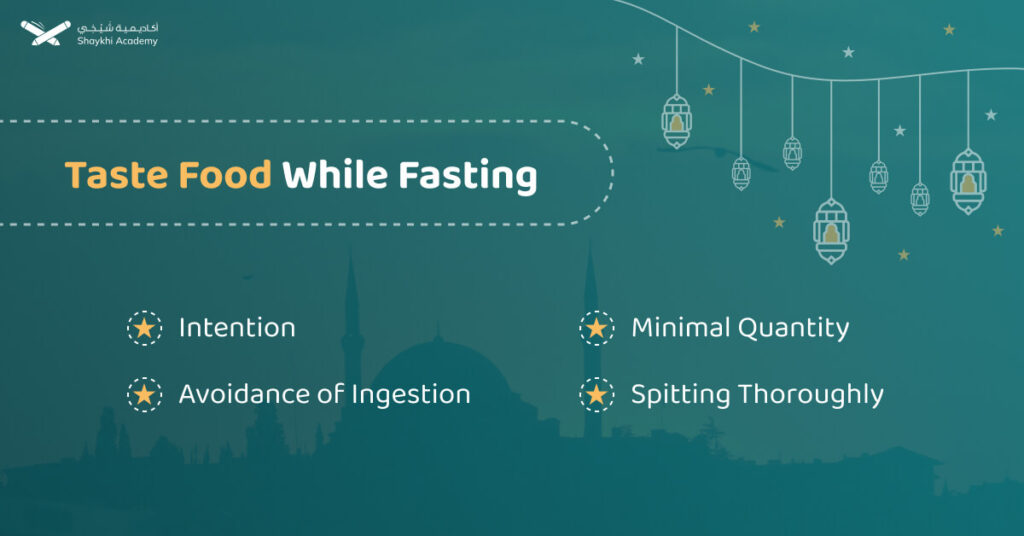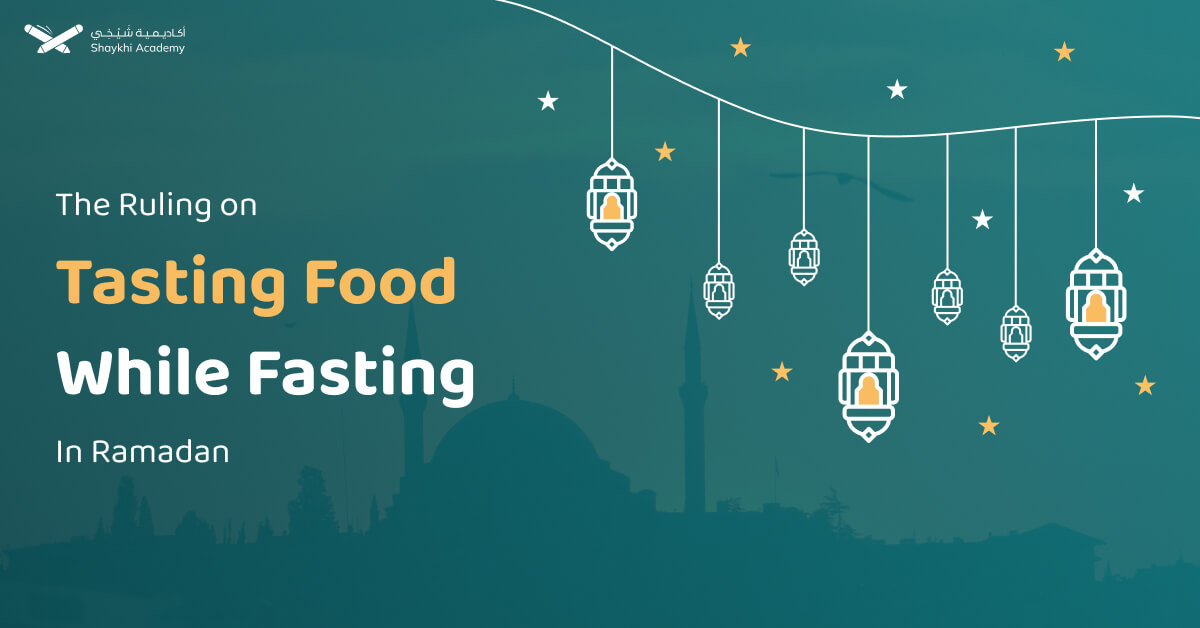In a nutshell: Tasting food for legitimate purposes such as cooking is allowed, provided it’s done without swallowing any substance and in minimal quantities. Similarly, licking food residue from fingers or utensils is permissible as long as no ingestion occurs.
However, tasting food without necessity or for pleasure is discouraged, although it doesn’t invalidate the fast. If someone forgets they are fasting and accidentally ingests something, the fast remains valid. Ultimately, Ramadan is a time for spiritual reflection, self-discipline, and deepening one’s connection with Allah.
Tasting Food While Fasting
Tasting food refers to the act of sampling or testing food for flavor, seasoning, or quality without actually consuming it. This practice commonly occurs during meal preparation or cooking when individuals need to assess the taste of dishes they are making for others.
Tasting food while fasting in Ramadan serves practical purposes, especially for those responsible for cooking or preparing meals for the family or community. It allows individuals to ensure that the food they are preparing meets desired standards of taste and quality, enhancing the overall dining experience for those who will eat it for Iftar.
For cooks and chefs, tasting food is an essential part of the culinary process, enabling them to adjust seasoning, ingredients, and cooking techniques to achieve optimal results. Even during Ramadan fasting, individuals involved in cooking may need to ensure that the dishes they prepare are flavorful and satisfying for those who will consume them later.

Does Tasting Food Break Fast?
No, testing the food while fasting in Ramadan does not break the fast, but you need to ensure you don’t swallow. According to Islamic scholars and jurisprudence, tasting food without swallowing it is generally permissible during fasting hours in Ramadan. However, some points should be taken into account in this regard:
- Intention: The intention to fast must remain intact, with the tasting of food being necessary for legitimate purposes such as cooking or meal preparation.
- Avoidance of Ingestion: While tasting food, one must ensure that none of it is deliberately swallowed. Swallowing even a small amount of food or drink invalidates the fast.
- Minimal Quantity: The amount of food tasted should be kept to the minimum required to assess flavor or quality, without indulging in excess or unnecessary sampling.
- Spitting Thoroughly: The tasted food must be spit out immediately and thoroughly, ensuring no particles reach the stomach.
Within these boundaries, certain situations allow for tasting food while fasting. For example, when preparing meals it’s permissible to briefly taste the food to adjust seasoning if necessary, regardless of gender. Remember to spit out the food immediately and avoid lingering flavors.
Similarly, if a doctor advises tasting a specific food for medical purposes, it’s considered permissible, ensuring minimal contact and immediate spitting. Additionally, when assisting others such as feeding an infant or someone unable to self-feed, briefly tasting the food to check its temperature or suitability is allowed. However, exercise utmost caution to avoid swallowing.
Be aware, that any intentional swallowing of food, even a tiny amount, breaks the fast. This includes swallowing food residue from tasting or accidentally consuming anything during the fast.
What is the Ruling on Tasting Food Without Necessity While Fasting?
Tasting food without necessity while fasting, for pleasure or out of curiosity, is discouraged (makruh), although it doesn’t invalidate the fast. It’s best to avoid this practice to strengthen self-control and focus on the spiritual aspects of Ramadan.
Islamic fatwas emphasize that tasting food is permissible without being disliked (karāhah) if done out of necessity, such as cooking. However, when done without necessity, it is considered makruh (discouraged). Some scholars even hold the view that tasting food is disliked in all cases, even when necessary. This distinction could be highlighted more clearly in your content.
Accidental Swallowing Rulings
Islamic rulings differ regarding what happens if food unintentionally reaches the stomach while fasting:
- Majority opinion (Jumhūr): If swallowed out of forgetfulness, the fast remains valid.
- Maliki school (Mālikiyyah): The person must make up the fast (qadā’).
Your content correctly presents the majority view but does not mention the Maliki stance, which requires making up the fast even if the swallowing was unintentional.
Deliberate Swallowing and Expiation (Kaffārah)
Your content correctly states that deliberately swallowing food invalidates the fast. However, some scholars, particularly within the Maliki school, require both making up the fast (qadā’) and expiation (kaffārah), while others only mandate making up the fast. This distinction could be clarified to present a more complete perspective.
What is the Ruling if I Forget and Swallow Something While Fasting?
If a fasting person unintentionally swallows something while forgetful, there is no sin upon them, and they should continue fasting. This is in accordance with the general principle in Islamic law that a person who forgets is excused. The Prophet Muhammad (peace and blessings be upon him) stated:
“Whoever forgets that he is fasting, and eats or drinks is to complete his fast, as it was Allah who fed him and gave him something to drink.” Sahih.
This hadith emphasizing the validity of the fast in such situations and the divine mercy extended to the forgetful person.
Can You Lick Food in Ramadan?
Yes, you can lick food while fasting during Ramadan. Rulings on licking food are the same as rulings on tasting food, so it’s permissible to lick food during fasting hours in Ramadan.
Permissibility of Licking Food:
- Avoidance of Ingestion: Similar to tasting food, licking food is permissible as long as there is no deliberate ingestion of any substance. If someone licks food residue from their fingers or utensils without swallowing it, the fast remains valid.
- Intent and Moderation: As with tasting, the intention behind licking food should not be to consume it but rather to clean or taste a minimal amount. Excessive licking or intentional consumption would invalidate the fast.
- Precautionary Measures: To ensure adherence to fasting guidelines, Muslims are advised to be cautious and avoid situations where the temptation to ingest food or drink may arise inadvertently.
By understanding the Islamic perspective and following these guidelines, Muslims can navigate the nuances of tasting food while fasting in Ramadan while maintaining the sanctity of the observance. Remember, the purpose of Ramadan is to deepen your connection with Allah (SWT) and practice self-discipline. By focusing on these aspects, you can fulfill the true spirit of the fast even while encountering situations like tasting food.
Living Out the Spirit of Ramadan
While understanding the permissibility of specific actions is essential, it’s crucial to remember that Ramadan is about much more than just technicalities. Living out the spirit of Ramadan encompasses a profound journey of spiritual reflection and self-discovery. It’s a time to delve deep into acts of worship, self-discipline, and compassion towards others, all while strengthening our bond with Allah.
Ramadan offers a unique opportunity for spiritual transformation, where we immerse ourselves in prayer, Quran recitation, and acts of charity to nourish our souls and elevate our spirituality. It’s a time to deepen our connection with Allah through heartfelt supplications, gratitude for blessings, and seeking forgiveness for our shortcomings.
Additionally, Ramadan teaches us the importance of cultivating patience and compassion in our hearts. Through fasting, we learn to control our desires and empathize with those who are less fortunate. We extend acts of kindness and generosity to others, embodying the spirit of empathy and understanding.
Transform Your Quranic Journey with Shaykhi Academy!
Embark on a transformative journey of Quranic education with Shaykhi Academy. Our platform offers unparalleled access to expert tutors, flexible scheduling options, and affordable rates, ensuring that Quranic learning is accessible to all. Choose from a diverse range of courses, including Quran recitation, Tajweed, Arabic language, and Islamic studies, tailored to meet the needs of learners at every level.
Why Choose Shaykhi Academy?
- Connect with highly qualified native tutors.
- Flexible scheduling to suit your busy lifestyle.
- Affordable classes tailored for all levels.
- Accessible from anywhere around the globe.
- Diverse Courses.
Join our community today and unlock the power of Quranic education with Shykhi Academy!

Conclusion:
Islamic scholars deem tasting food for legitimate purposes, such as cooking or meal preparation, permissible during fasting hours, provided no substance is swallowed, and moderation is exercised. Licking food residue is also allowed under similar conditions. However, tasting food without necessity or for pleasure is discouraged to uphold the spiritual essence of the fast.
If someone forgets they are fasting and inadvertently ingests something, their fast remains valid, as per the teachings of Prophet Muhammad (peace be upon him). Ramadan isn’t just about adhering to technicalities; it’s a time for spiritual transformation, self-discipline, and compassion towards others. Through acts of worship, reflection, and kindness, Muslims deepen their connection with Allah and embody the true spirit of Ramadan.
Additionally, platforms like Shaykhi Academy offer opportunities to enrich one’s Quranic journey, fostering a deeper understanding of Islam and enhancing spiritual growth. By embracing these values, Muslims can make the most of Ramadan and experience its profound blessings.

















































